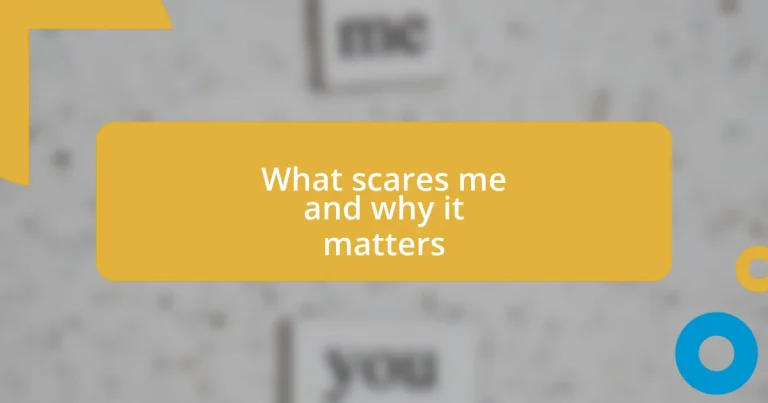Key takeaways:
- Acknowledging fears is the crucial first step towards overcoming them and empowers personal growth.
- Common fears such as public speaking, failure, and social anxiety connect us, showing we are not alone in our struggles.
- Utilizing coping strategies like deep breathing and reframing fear can transform it into a catalyst for resilience and opportunity.
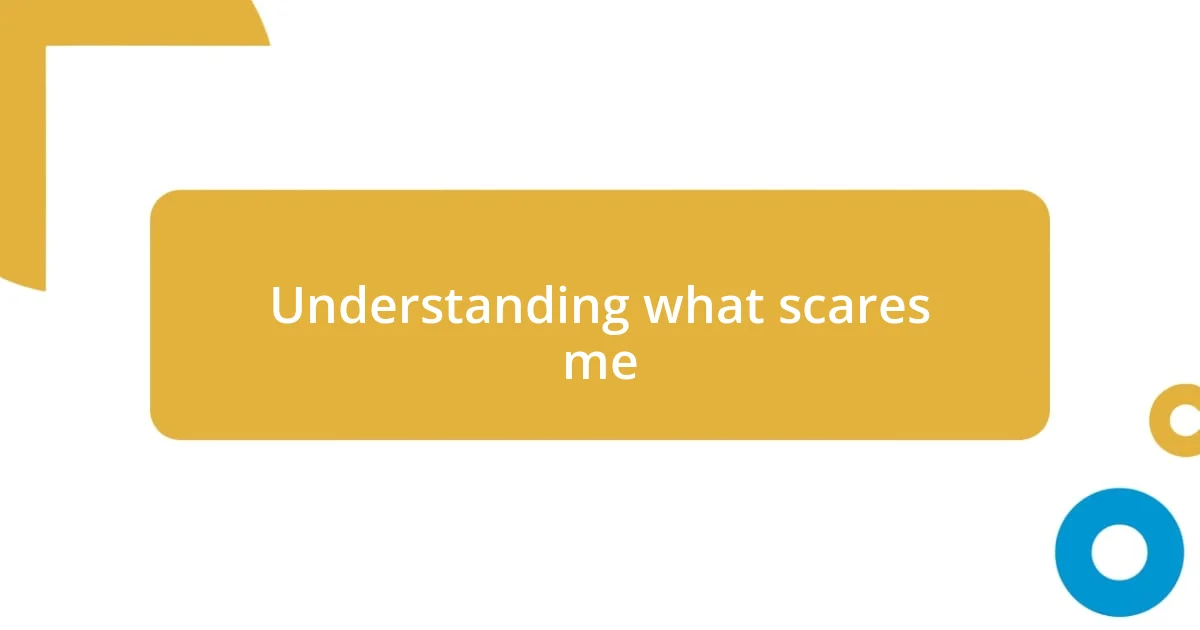
Understanding what scares me
Fear often feels like a physical presence, doesn’t it? For me, it’s that sudden pit in my stomach when confronted with the unknown. I remember standing backstage before my first public speaking event; the fear of judgment and failure loomed so large it almost made me forget my own name. It’s those moments that remind me fear is not just an emotion; it’s a lens through which we view challenges.
Delving deeper into my experiences, I’ve recognized that some of my fears stem from past failures. Each time I hesitated during a presentation or let an opportunity slip away, a shadow of doubt crept in. I wonder if you’ve felt that same weight—doesn’t it sometimes feel like we’re shackled by our past mistakes? Understanding this connection between my history and my fears has been a crucial step in addressing them.
But what about those irrational fears that catch us off guard? I distinctly recall my paralyzing fear of heights. Even standing on a balcony made my heart race uncontrollably. I’ve come to learn that understanding these fears, even if they seem absurd, is vital. Isn’t it fascinating how our minds can conjure up fears that seem entirely unwarranted? Exploring these fears leads me to questions about my sense of safety and comfort, providing valuable insights into my emotional landscape.
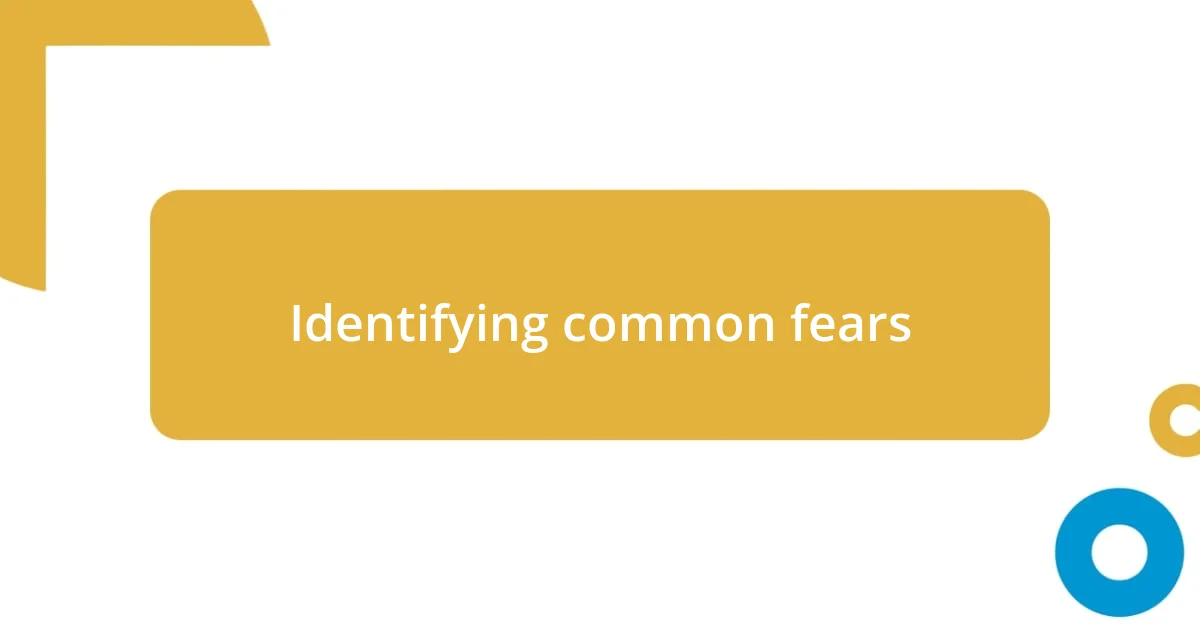
Identifying common fears
Identifying common fears can often reveal patterns in our emotional experiences. It’s intriguing how many people share similar fears—like the fear of public speaking, which I once felt paralyzing. I still recall the palpable tension in my chest, as if the weight of everyone’s expectations rested solely on my shoulders. This commonality in fear connects us, showing that we’re not alone in our struggles.
Another prevalent fear is the fear of failure. Personally, I’ve struggled with this one throughout my academic and professional journey. Each time I approached a significant milestone, the thought of not meeting expectations loomed like a dark cloud. I often wondered, “What if I don’t measure up?” This fear can sometimes motivate us, but it can also hold us back. Isn’t it ironic how the desire to succeed can spiral into a fear of failing?
Lastly, let’s talk about social anxiety, a fear that many face in today’s interconnected world. I remember attending a gathering where the loud buzz of conversations made me shrink into myself. It felt overwhelming, as if everyone was scrutinizing my every move. Realizing that many others feel this same discomfort has helped me embrace vulnerability, reminding me that these fears are a shared experience. Isn’t it refreshing to think that our fears can create a bond rather than isolate us?
| Common Fear | Personal Reflection |
|---|---|
| Fear of Public Speaking | A feeling of immense pressure, recalling the anxiety felt before speaking in front of an audience. |
| Fear of Failure | An ever-present doubt that often overshadows achievements, making me question my self-worth. |
| Social Anxiety | A sense of isolation in crowded settings, highlighting how common discomfort can bridge connections. |
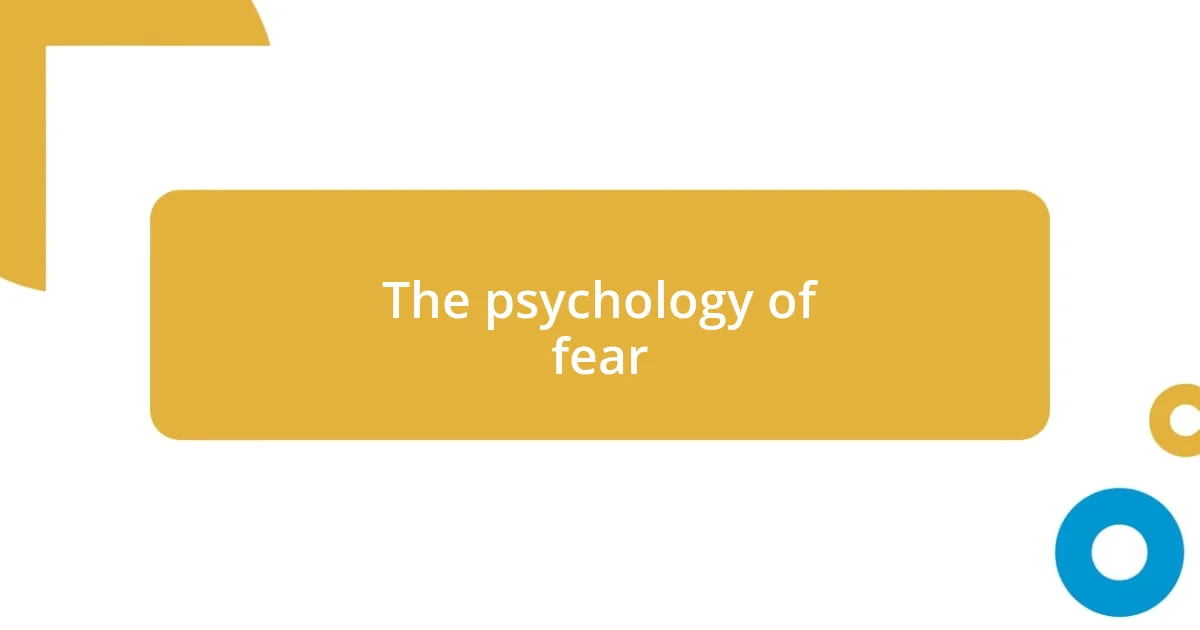
The psychology of fear
Fear is deeply rooted in our psychology, influencing our thoughts and behaviors in profound ways. I can recall a time when I was walking through a darkened room and suddenly felt an overwhelming urge to flee. I realized later that fear activates the amygdala, our brain’s fear center, triggering our fight or flight response. This instinctual reaction has helped humanity survive for millennia, but in modern life, it can create distress in everyday situations.
Here’s what I’ve learned about fear and its psychological underpinnings:
- The amygdala acts as an alarm system, responding to perceived threats quickly.
- Fear can be conditioned; repeated negative experiences can create lasting fears.
- Cognitive distortions, such as catastrophizing, often amplify our fears beyond their actual likelihood.
- I sometimes find myself ruminating over minor mistakes, turning them into exaggerated fears of failure.
Understanding this psychology helps demystify why certain fears feel so paralyzing. In my case, the fear of judgment during a performance is reminiscent of a time when I blanked out on stage. The aftermath wasn’t just embarrassment; it ignited a cascade of self-doubt that echoed for days. As I explored those feelings, I recognized they stemmed from a mix of past traumas and my desire for acceptance. That realization transformed my experience, shifting from avoidance to a more proactive approach in confronting these fears. Engaging in this self-reflection allows me to understand the underlying mechanics of my fear, revealing that recognizing it is often the first step toward overcoming it.
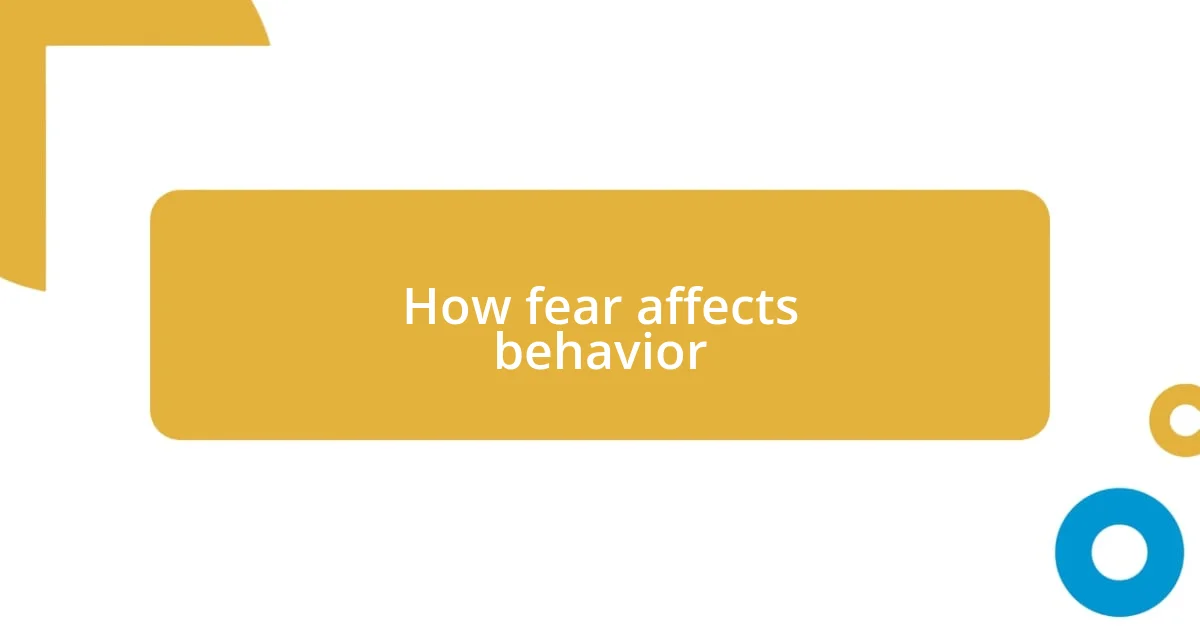
How fear affects behavior
Fear dramatically influences our behavior in both subtle and overt ways. I often find that when fear arises, my first instinct is to withdraw. For example, I remember being invited to a networking event where I knew no one. The moment I walked in, anxiety gripped me, urging me to turn around and leave. In that moment, fear became a barrier, preventing me from engaging with new opportunities and connections. Have you ever felt that tension, where stepping outside your comfort zone seemed impossible?
On the flip side, fear can also provoke action. I’ve had instances where my fear of missing out pushed me into social events, despite my initial hesitance. The adrenaline rush that accompanies that decision often transforms dread into excitement. It’s fascinating how the same emotion—fear—can simultaneously hold us back and push us forward. In those moments, I’ve learned to recognize fear as a signal to reassess my limiting beliefs rather than an absolute stop sign.
Then there are times when fear manifests as overthinking, clouding my judgment. I’ll recall a project deadline looming over me, triggering a cycle of panic. I’d replay every possible scenario of failure in my head, feeling paralyzed. This tendency to spiral into worst-case thinking isn’t just my experience; many share this struggle. Recognizing this pattern helps me regain control. So, how do we break free from these mental traps? Understanding that fear can drive us to both positive and negative actions is the first step towards transforming its impact on our behavior.
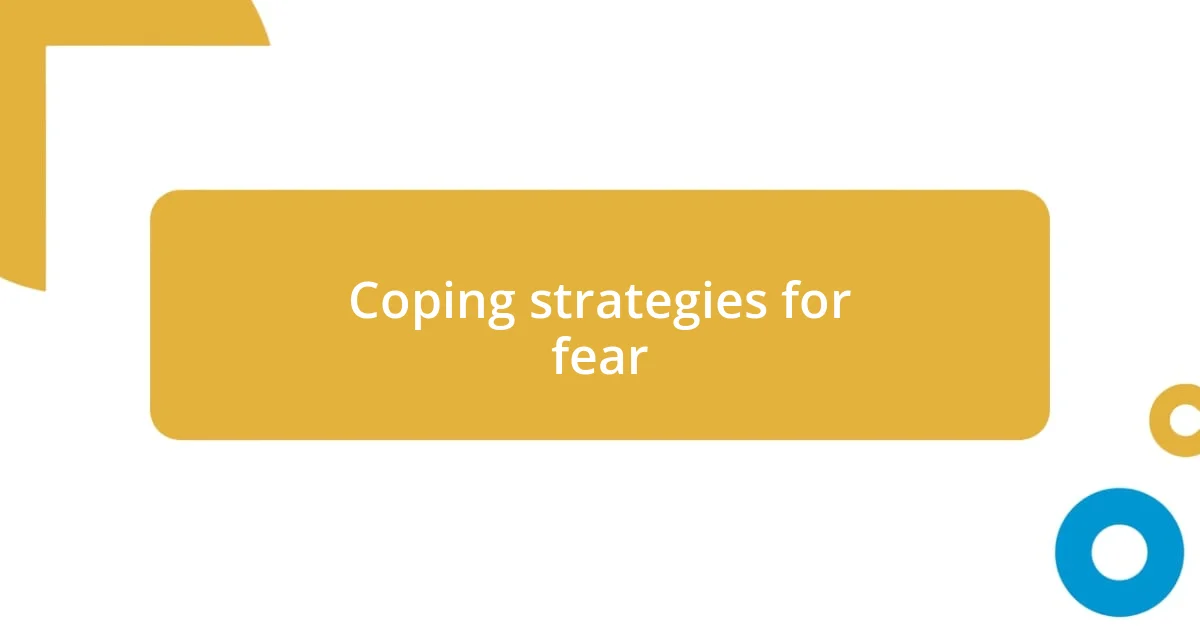
Coping strategies for fear
Coping with fear can be a highly personal journey, and I’ve discovered a few strategies that have really helped me. One effective approach is deep breathing. I remember a time when I was preparing for a big presentation and my mind raced with anxiety. Taking a moment to focus on my breath—slowly inhaling and exhaling—grounded me and reduced that overwhelming feeling. It’s a simple yet transformative way to bring yourself back to the present.
Another strategy I find valuable is reframing how I perceive fear. Instead of seeing it as something to avoid, I try to view fear as a signal of growth and potential opportunity. For instance, during a challenging project at work, I felt a familiar wave of dread wash over me. Then, I asked myself: “What if this fear means I’m on the brink of something great?” Embracing this shift in perspective not only eases my anxiety but also fuels my determination to tackle the situation head-on.
I also lean heavily on the support of friends and family when fear feels overwhelming. There was a time I was paralyzed by the thought of failing an important exam. Talking it through with a friend helped me realize I wasn’t alone in my struggles; many of us fear failure together. Their encouragement made it easier to face my fears rather than let them dictate my actions. Have you considered who in your life might help you weather these storms? Seeking support can be the lifeline that helps us navigate through our fears.
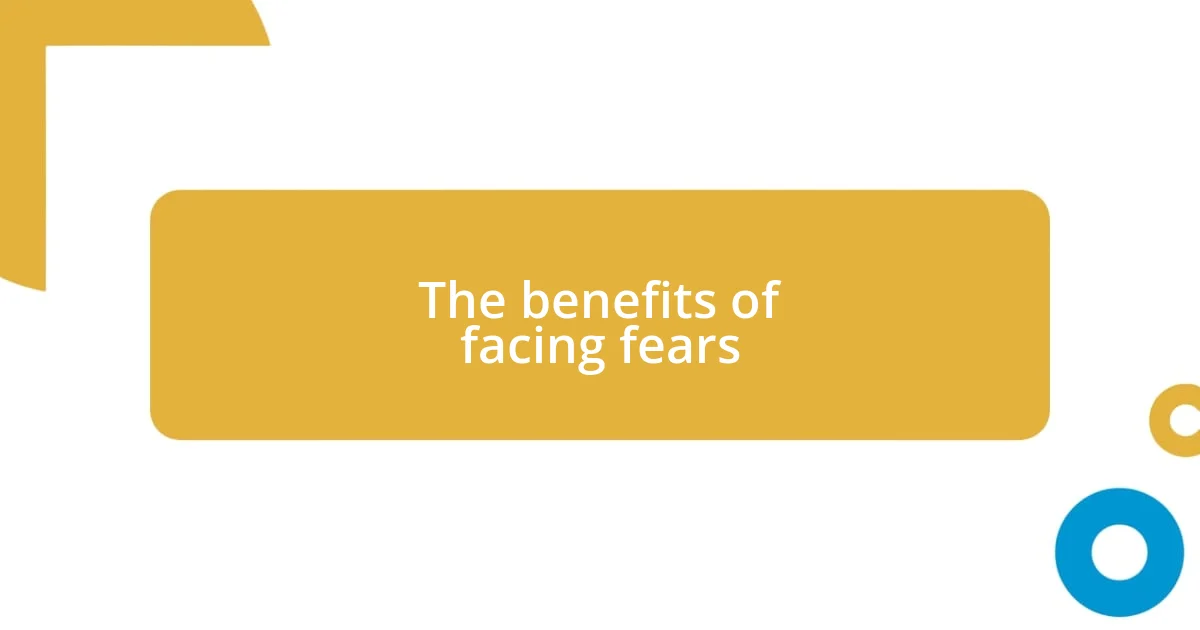
The benefits of facing fears
Facing fears can lead to significant personal growth. I remember the time I signed up for a public speaking course, despite my overwhelming anxiety about addressing an audience. Standing in front of strangers, heart racing, I realized that by pushing through that fear, I became more confident not just in my ability to speak, but in my overall sense of self-worth. Isn’t it incredible how confronting something terrifying can bring out hidden strengths?
Another benefit I’ve experienced from facing fears is the sense of belonging. I once avoided social gatherings because the idea of meeting new people made my stomach churn. However, after accepting an invitation despite my trepidation, I found myself in lively conversations and even making new friends. That experience taught me that the discomfort of fear can be a threshold to genuine connections. Have you ever found joy in unexpected places after taking that initial leap?
Lastly, confronting my fears has taught me resilience. I recall a time when I took on a challenging work project that was completely outside my expertise. At first, the fear of failure loomed large, but as I navigated through inevitable setbacks, I discovered an inner strength I didn’t know I possessed. Each small success built my confidence, proving that facing fears is not just about the outcome but about the growth experienced along the way. Isn’t it empowering to realize that we’re often more capable than we think?
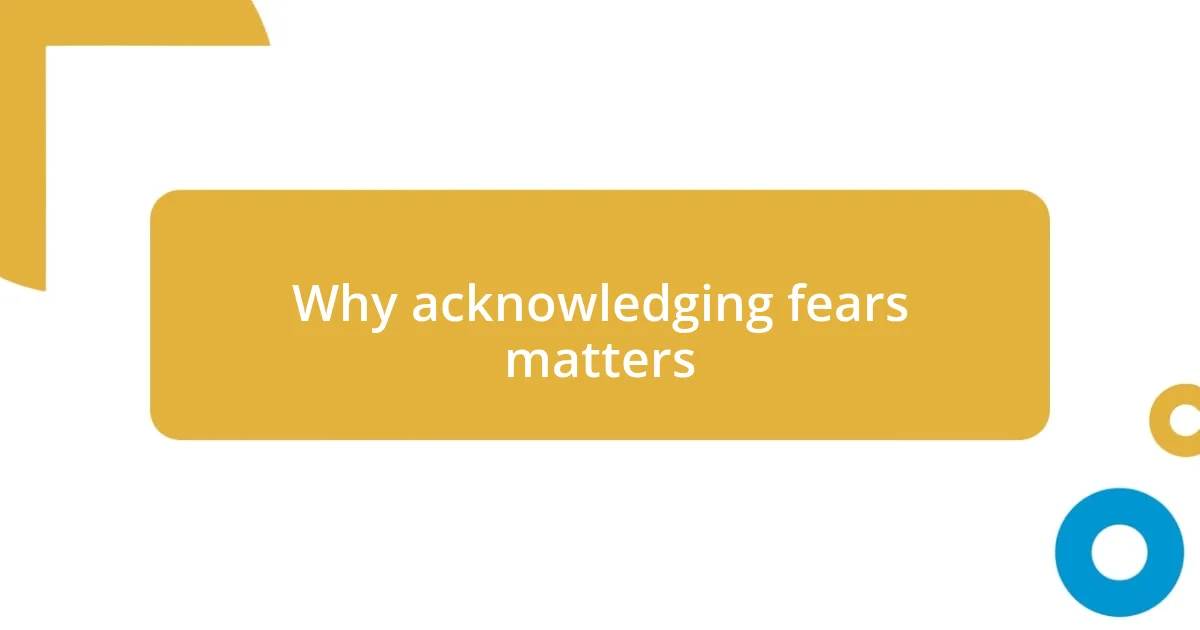
Why acknowledging fears matters
Acknowledging our fears is the first step toward overcoming them. When I finally admitted my fear of heights, I realized it wasn’t just an irrational phobia; it was holding me back from experiencing amazing views and adventures. Recognizing that fear empowered me to seek ways to confront it, like taking a climbing class. Have you ever felt liberated after admitting something you feared?
There’s a profound relief that comes from simply naming our fears. I remember the first time I openly discussed my fear of failure with a close colleague. It felt like lifting a weight off my shoulders. In doing so, I found out I wasn’t alone—so many of us grapple with this insecurity. Acknowledging it mattered because it opened the door to conversations that lead to strategies for coping, like setting realistic goals and seeking guidance.
Moreover, acknowledging fears nurtures self-awareness. I’ve found that when I sit down and reflect on what truly scares me, I discover underlying motivations and insecurities that I didn’t realize were influencing my actions. For instance, not wanting to apply for a promotion was rooted in a fear of inadequacy. By examining that fear, I could tackle my feelings head-on and change my narrative. How many opportunities could we seize if we only dare to confront what holds us back?












